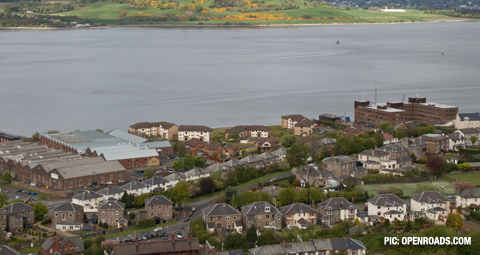July 13 | ![]() 0 COMMENTS
0 COMMENTS ![]() print
print

The challenge of living in a small town
THE BOW IN THE HEAVENS on the ups and downs of having a place where everybody knows your name — By FR JOHN BOLLAN
Last Sunday’s Gospel—‘a prophet is only despised in his own country, among his own relations and in his own house’—always makes me smile. I have some experience of being a ‘prophet’ among my ain folk, although I’ve been lucky enough not to be despised (not yet, at least).
Greenock is a really just a big village and I left it as a teenager, when I headed off to law school in Edinburgh, never really returning until four years ago. I always consider it a good fortune that I never came to work in my home town, among my own people, while my mother was alive.
If people didn’t like me, she would have taken it very personally. On more than one occasion she told me, ‘If I heard anyone speaking badly of you, I’d be getting the pins out.’
You may not have been aware that the mothers of priests are routinely sent on basic courses in voodoo to deal with such contingencies.
As she made her stately progress through the town centre, she would occasionally pick up gripes and whispers about some of the local clergy. Rather than join in, she would always put herself in their position—or at least in their mothers’ shoes: how would she feel if it were her blue-eyed boy who was getting talked about in such withering terms? In fact, forget the pins: she had a mean left hook.
I suppose there are reasons why being a priest or a prophet in your home country can have some advantages. You know the lie of the land, you can ground the Gospel in the soil in which you yourself were once planted. But the disadvantages can be every bit as real because while, as the saying goes, it takes a village to raise a child, some villages don’t ever let go of that child.
There is something of that in Nazareth. The people look at Jesus and can’t see past his family or what they know of him. The Gospel says their problem is a lack of Faith and I think that may be because a key ingredient of Faith is the ability to be surprised by God.
And even though, as the Gospel acclamation put it, ‘the Word had become flesh and dwelt among them,’ they seemed oblivious to the fact. It was really their own capacity for the miracles that they had stifled, not so much Jesus’ ability to perform them.
I myself am no miracle worker. I would like to think, however, that any good I have done here would bear some fruit, whether it’s because I’m ‘Josie’s boy’ or in spite of it.
The most recent census indicated that the number of those identifying as Roman Catholics exceeded those identifying with the Church of Scotland. This explains why Inverclyde has the highest concentration of ‘bottoms on pews’ in our diocese and why, perhaps, we tend to have fewer Orange Walks going past our door during the marching season, which reaches its peak just now.
It was quite different when I was a curate in Johnstone: we were in a prime marching location. The ‘walk’ used to slow the pace and turn up the volume as it approached St Margaret’s. I gather that one of my predecessors as a curate (and now a neighbour here in Greenock) had to take his grievance all the way to the secretary of state for Scotland after a service was disrupted by the colourful procession outside.
I have to say, though, that even if that incident successfully led to the cessation of drumming—save for the keeping of time—while the marchers passed the church, there was still something quite intimidating about the whole thing. As I peered from my window, I witnessed the frankly ridiculous spectacle of the participants pointedly ignoring the church itself (some even looking away altogether), as if we had put it there to annoy or inconvenience them. I suppose though, on some level, that is exactly how they see it.
Like many people of various faiths and none, I was shocked and upset to see the reports about last Saturday’s incident outside St Alphonsus’ Church in Glasgow. Anyone who has ever observed an Orange Walk will know that, alongside the massed ranks (maybe ‘massed’ isn’t a term they’d welcome) marching in time to the trilling flutes and pulsating lambegs, there are others who saunter alongside. It is these elements, often dehydrated by the sun and whipped into a frenzy by the heady mix of 17th century politics and rousing folk tunes, who pose a threat to public order.
Arguments based on civil liberties and freedom of speech are often adduced to justify the right of those who wish to march to do so. That said, it requires very special pleading to suggest that the fringe disorder has nothing to do with the Order itself, or at least the parade which is taking place under its auspices. A priest and his parishioners may have been the target of antisocial behaviour without the presence of a nearby march, but I think it would be considerably less likely, wouldn’t you?
When it comes to this aspect of Scotland’s history (and, for some, it is very much a feature of the present), there is a need for both sensitivity and pragmatism. There is a fine line, I know, between protecting communities and ensuring that other communities have their rights respected, but it’s a line which the unrulier adherents of William of Orange struggle to walk.
As I write this column, I have suddenly realised that, like Macauley Culkin back in the day, I am ‘home alone.’ Both my big sisters and my two eldest nieces (and honorary wee sisters) are on holiday. What am I supposed to do if there’s an emergency?
That is one of the disadvantages of being in a close family (in a small town): you develop a kind of helplessness and a very loose definition of emergency. I can cry ‘emergency’ when I run out of milk or if I need Jasmine walked due to a sudden commitment. Someone is usually there to help. I know there are others who would come running if needed, but I feel a little exposed just now. That said, I’m happy to be enjoying the bearable heat during my ‘staycation’ while they bake in various hotspots around the globe.
Although the sun is glorious, it did get a little too hot to handle one day last week. The long weeks of sunshine have left the normally spongy terrain of the Bow looking a little arid and crunchy underfoot.
Last Thursday, as I sat at my desk, I became aware of a distinct aroma of woodsmoke on the air.
It transpired not to be an early barbecue (like the one we ourselves had enjoyed the week before) but a grass fire on the other side of the fence on the golf course.
Smoke and ash were drifting on the wind from a blaze which had taken hold of various parts of the course, from Lyle Hill down to the back of the rectory. Sure enough, the fire brigade arrived and did their best to contain and extinguish the fire, which they did eventually.
I must admit that it did get a bit hairy as the smoke grew thicker and more acrid. We don’t have a swimming pool into which I could throw things to escape the flames, just that paddling pool which would have gone in seconds, had the flames encroached any further.
Having recently had cause to praise the police, I must here record my gratitude to the fire brigade, tackling a fire on one of the hottest days of the year.
As my mother would have done herself and most certainly would expect me to do, I walked up the hill to offer them some cold drinks. By the time I got there, there was just one officer manning the pumps while his colleagues were still on the course.
Although he declined the can, he accepted my thanks. As I turned to walk back to the house, I noticed him squinting at me. It was not, as I thought at first, an effect of the smoke, but an attempt to put a name to my face. ‘Were you in school with me?’, he asked. See? I told you: Greenock is a village.










